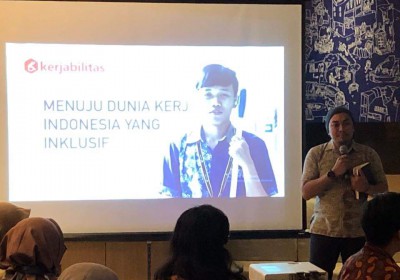Recruiting Persons with Disabilities: Rely on Ability, Not Their Shortcomings
September 26, 2019
DEVI Speed Date: Promoting Inclusive Employment Opportunities, 25 June 2019.
Recruitment of workers with disabilities still uses the mindset that persons with disabilities will be employed according to the type of disability. This was conveyed by persons with disabilities as well as Project Officer Christoffel Blindenmission (CBM), Jaka Ahmad.
"Actually, decent work for disabled friends should refer to their abilities, not their shortcomings, as most companies or other organizations have done so far," Jaka said at the Road to IDF 2019 DEVI Speed Date: Promoting Inclusive Employment Opportunities, 25 June 2019.
According to Jaka, recruiters often see their disabilities first.
"For example, a blind person who relies on his hearing, can only be employed as a telephone operator. That way we forget about his other abilities. Apparently, he can create a website, become IT officer, or he may have the ability to develop a communication strategy. This is what actually must be explored first from them," Jaka explained.
By prioritising on capabilities, recruitment policy will encourage companies or organisations to invest in developing their abilities, so that the contribution of workers with disabilities to institutions increases. Furthermore, said Jaka, disabled employees can be actively involved in various activities. For example, in decision making and others.
Unfortunately, according to Jaka, not many inclusive organizations do this. However, Jaka added that CBM and many Disabled People’s Organizations / DPOs appreciated the good initiative of companies that began to openly accept persons with disabilities. Jaka did not deny that companies or organisations must make a lot of adaptation in promoting disability. Especially related to technical matters such as facilities and infrastructure.
“There must be good advice and direction on how to build the capacity of workers with disabilities so that in the end, both companies and workers can enjoy mutual benefits and they realize they need one another," he added.
He gave an example that optimally increase the productivity of those with physical disabilities, which was that there should be a policy to allow them to work at home.
"For example, three days a week they can work from home. The important thing is the output," Jaka added.
Adaptation Doesn't Have to Be Expensive
Adaptation was made by Bank Mandiri Yogyakarta, which currently employs 23 workers with disabilities. Asih Samihadi from Bank Mandiri Yogyakarta said the company provided special infrastructure such as persons with disabilities-friendly toilets and made policy that allowed all persons with disabilities to work and do activities on the ground floor. This is considered a solution because elevators are relatively expensive. They also facilitate technical and capacity building trainings.
"One program that Bank Mandiri Yogyakarta does at the end of each year, we provide startup capital if they decide not to continue working with us and want to open a business, and so far the demand has been high," Asih added.
Acceptance by other workers is also very important.
"Before they joined, we told the employees who have been there. My message to them is if they empathize, show it with actions, and not words, "Asih added.
They need to act naturally around their disabled colleagues so they will feel accepted and equal.
"However, these disabled friends are also quick to adapt. Even though they are placed on the first floor, they often go up to the top floor. Those with physical disability also take place in sports and other activities," she said.
What about the performance of the workers with disabilities?
"There is no difference between ordinary workers and workers with disabilities, maybe it's just a matter of speed at the start. Once they start, they can adjust. In fact, there are some employees with disabilities who work faster than others, because they are more thorough, more focused. They also dare to say no when serving customers," said Asih.
The above average productivity of employees with disabilities can also be found in Kerjabilitas, a platform that helps persons with disabilities find jobs. The Chief Technology Officer of Kerjabilitas, Teti Sianipar, shared the performance of disabled employees at Wikipedia Foundation.
“They have data entry staff whose duty is to scan documents and put them in a folder. The productivity of deaf workers doing this task is almost 300 percent of that of the ordinary workers," said Teti.
According to Teti, several companies have realized the advantages of employing persons with disabilities. What now still frightens companies is the provision of physical access and technical matters. Employers are worried that they must invest heavily they make a policy to recruit workers with disabilities.
However, Teti said that things were getting better now.
"In the last two years, especially after the Asian Para Games, much to our dismay, they just started to know the term diffable," she added.
Teti believed that in the future more and more companies would understand that recruiting workers with disabilities does not have to be expensive.
Raising awareness among employers to create an inclusive work environment and equal employment opportunities was one of the focuses of Road to IDF 2019, DEVI Speed Date: Promoting Inclusive Employment Opportunities. This event is a step to open the perspective of multi-stakeholder collaboration to encourage inclusive growth which will be discussed in the 2019 Indonesia Development Forum with the theme Mission Possible: Seizing the Opportunities of Future Work to Drive Inclusive Growth on 22-23 July 2019 at the Jakarta Convention Center Convention Center.
Indonesia’s Research Institutions Supporting the Development of the Electric Vehicle Industry
Indonesian Muslim Fashion and Cosmetics IKMs Shine at Dubai World Expo 2020
Govt Steps Up UMKM Transformation Efforts in the Midst of Pandemic Slowdown
Govt Encourages Promotion of IKM Products in Digital Era
Government Begins Developing Maritime Training Center in Makassar
Tweets by IDDevForum
